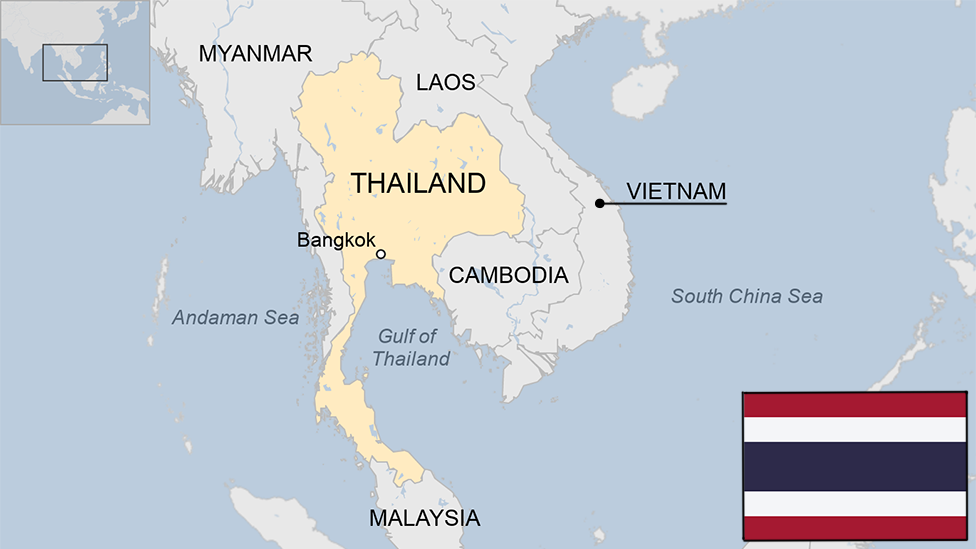Life and death on Thailand's lethal roads
- Published
The BBC's Jonathan Head looks at the cost to human lives of Thailand's poor road safety record.
There is a ritual that is now very familiar to Thais, before the two big holiday seasons of the year, in late December for the new year, and in April for the Songkran Festival.
The government will set a target for reducing fatalities on Thailand's notoriously dangerous roads, exhorting Thais not to speed, or drink and drive.
Sometimes good citizens will run publicity stunts, like the coffin-maker, who last year invited journalists to film the huge stockpile his workers were building up for the holiday season.
And every year these efforts fail.
The grim statistics of death and injury on the roads are tallied each day in the media with, as often as not, worse figures than the year before.
And so it was this last new year - 478 people lost their lives on the roads in just seven days.
In one horrific collision in Chonburi on 2 January, 25 people died - some burned to death in a crushed and overcrowded passenger van they could not escape.
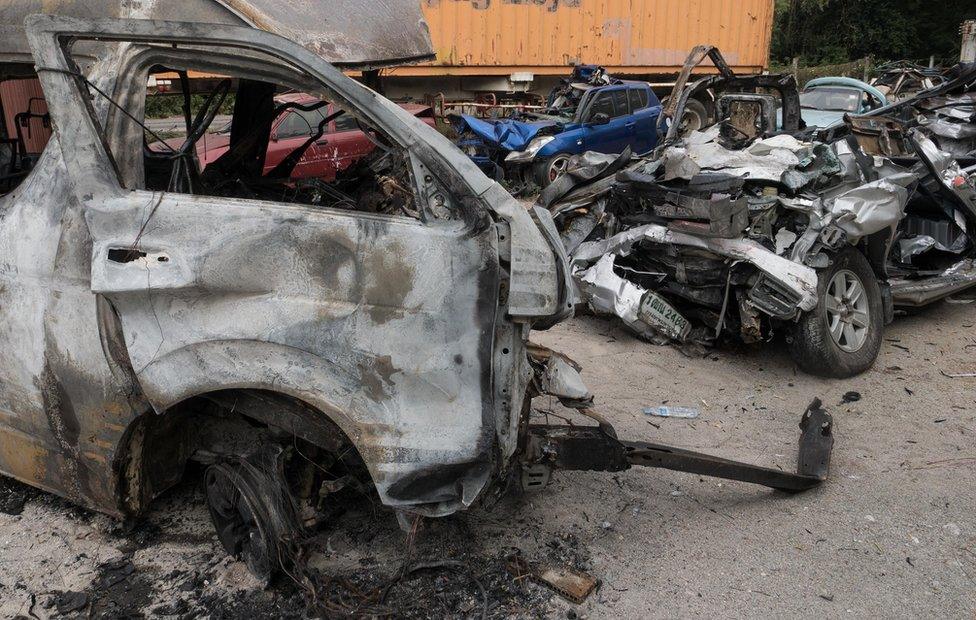
In the latest high-profile accident, a pick-up truck collided with a passenger van, killing 25 people
Thailand's roads are currently ranked the second most lethal in the world after Libya's by the World Health Organization.
This status is all the more extraordinary given the fact that Thailand has been peaceful and increasingly prosperous for decades, with governments that in other fields, like healthcare and infrastructure, have made impressive progress.
In 2011 the then-government announced the following ten years as Thailand's 'Decade of Action on Road Safety'.
It declared 2012 as the year of 100 percent helmet use on motorbikes.
In 2015 the Department of Disaster Prevention, which is tasked with road safety in addition to problems like floods and landslides, boldly announced a target of reducing road deaths by 80%.
All in vain.
The challenge they face is not hard to see. Thailand's rapid development has bequeathed it an unrivalled network of 462,133 roads in the region, nearly all paved, with plenty of multi-lane highways.
There are 37 million registered vehicles, 20 million of them motorbikes, and millions more that are unregistered.
Driving on a Thai expressway is akin to playing a hyper-caffeinated video game. A cursory web search for road accident videos will throw up examples of breathtaking, sometimes suicidal, recklessness. Drunk driving is a huge problem.
In 2014 and 2015 three foreigners, a British couple and a Chilean man, who were cycling around the world, and near the end of their journeys, were killed while travelling through Thailand.
A pick-up truck driver, who struck the British couple while trying to reach a hat on the floor of his cab, was fined the equivalent of $30 and given a suspended prison sentence.
"Thailand has beautiful roads", explains Ratana Winther, the country director for the US-based Asia Injury Prevention Foundation. "And people tend to go very fast. So the number one killer is speed."
Police Sergeant-Major Kanthachat Nua-on can attest to that.
At a speed trap he had set up on a stretch of elevated expressway outside Bangkok, he watched car after car pass him at speeds well in excess of the 80km/h (50 mph) limit. He did not bother to ticket them.
"If we strictly follow what the law says, and issue a ticket for people driving over the speed limit, then we will end up booking everyone."
He booked just one car, travelling at 129km/h. But the fines are small, and more than half of those ticketed do not bother to pay, with little follow-up.
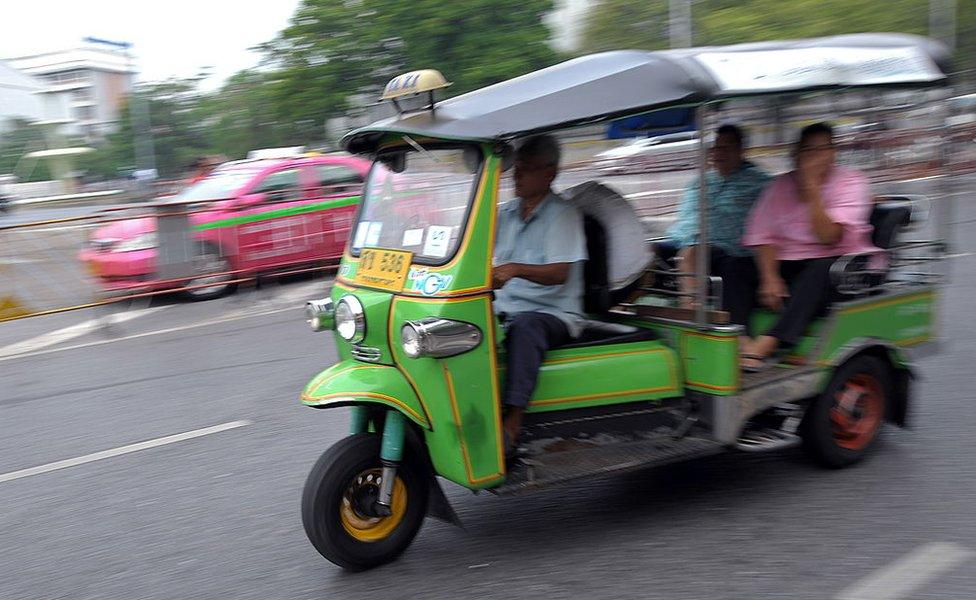
There are now 37 million vehicles on Thailand's roads
In recent years there have been a number of cases where drivers from wealthy families have killed, and been treated with extraordinary leniency.
In 2012 the grandson of the man who made a fortune from the Red Bull energy drink killed a policeman while driving at speed in his Ferrari. He was charged, but has repeatedly failed to show up in court.
Another case was that of a 16-year-old girl from an influential family, driving without a license, who struck a passenger van, killing nine of its occupants.
She was given a suspended prison sentence, and ordered to do community service - which it turned out two years later she had avoided doing.
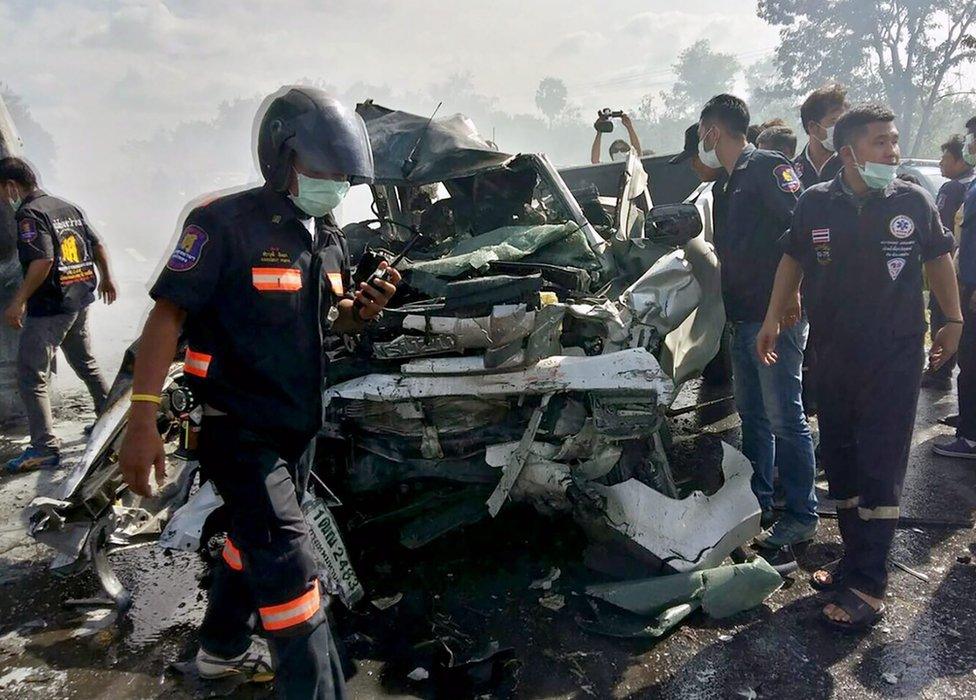
Some 24,000 people are estimated to die on Thailand's roads each year
Law enforcement problem
"Enforcement is the key", says Ratana Winther. "But that is not just about telling the police to enforce the law. The police should be told to prioritise traffic policing over traffic management.
"But it is a multi-sectoral challenge. The punishment needs to be big enough for people to be afraid of it. And the safety campaigns must be continuous, not just at peak seasons. Then we need to move on to issues like improving the engineering of roads."
Former Deputy Transport Minister and safety campaigner Nikorn Chamnong goes further.
"We need to go back and change the DNA of the country," he says. "Education, right back in schools, is important".
He has been petitioning the current military-appointed National Assembly to do more. It is now on the point of approving ten changes to driving laws, including mandating the use of rear seatbelts - overall the largest overhaul of road safety legislation in 40 years.
But no-one knows how well these laws will be enforced.
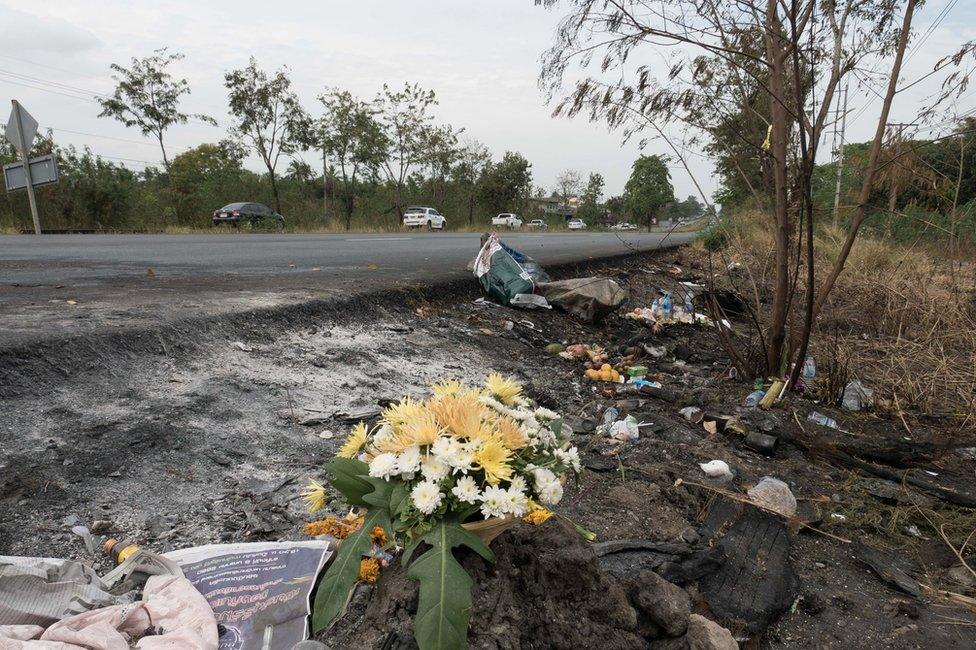
Mourners have left flowers at the site of the accident in Chonburi
Members of the public are cynical. "There is a saying, that a true Thai follows his own rules," said Pongsak Putta, a motorbike taxi driver, who was hit by a car and injured over the new year.
"As long as it does not happen to them, people do not think safety is an issue," said Pornpen Wongbantoon, who complains about the poor driving of the buses she has to take to work.
"Enforcement is everything," says Dr Liviu Vedrasco, who works on road safety at the World Health Organization.
The government officials he works with are serious about road safety, he believes, but co-ordination is a real challenge.
Separate motorbike lane?
The Road Safety Direction Centre is responsible for leading on the issue, but is subsumed within the Disaster Prevention and Mitigation Department, which is itself within the Ministry of Interior. Roads are the responsibility of the Ministry of Transport.
Dr Vedrasco believes the best way to cut the appalling death toll on the roads is to focus on the most vulnerable group, motorbikes, which account for 80% of deaths.
"If you cannot reduce the number of motorbikes, the next best thing is separating them. Make a dedicated lane; maybe not a hundred percent of roads in Thailand, but aim to increase the percentage of roads with separated traffic - this will definitely have a tremendous impact."
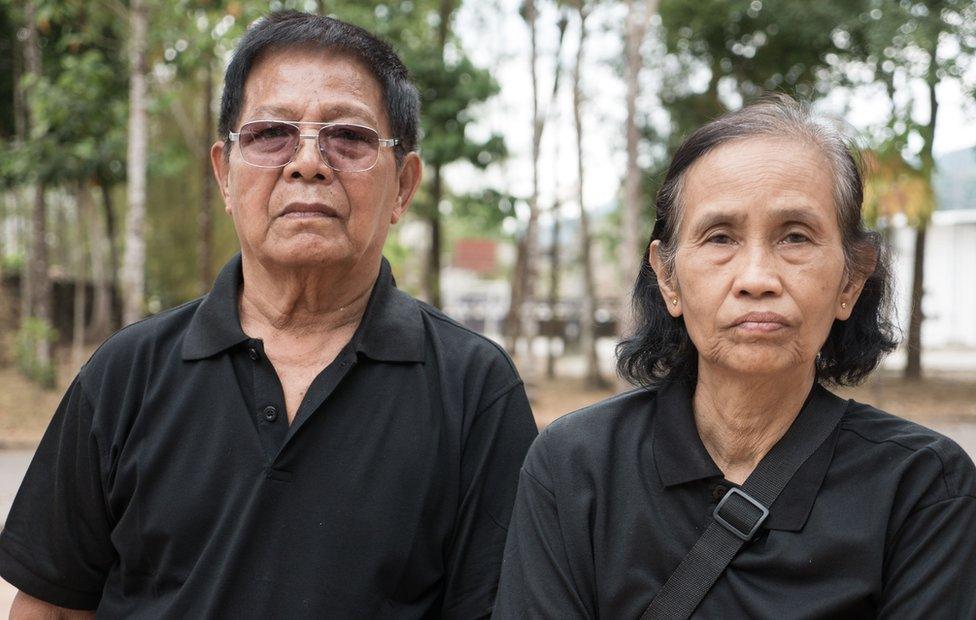
The parents of Hathaitip Modpai, one of the victims of the 2 January crash, have been grieving their daughter's death
After the shocking collision in Chonburi, the government has promised to phase out passenger vans, which it says are not designed to carry up to 15 people over long distances.
The police believe the 64 year-old driver fell asleep at the wheel. He was on his fifth 300km, 3.5 hour journey in 33 hours.
Twenty-six-year-old Hathaitip Modpai was one of the victims. She had been travelling in the van back from a new year visit to her parents to Bangkok, where she worked as a car saleswoman. She was an only child.
After her funeral, her mother, Wimol, reflected on what the impact of her daughter's death would be.
"I wish the government would do more," she said. "After the accident people got excited for a while, but once the fuss dies down, everything will go back to the way it was before."
- Published16 August 2024
